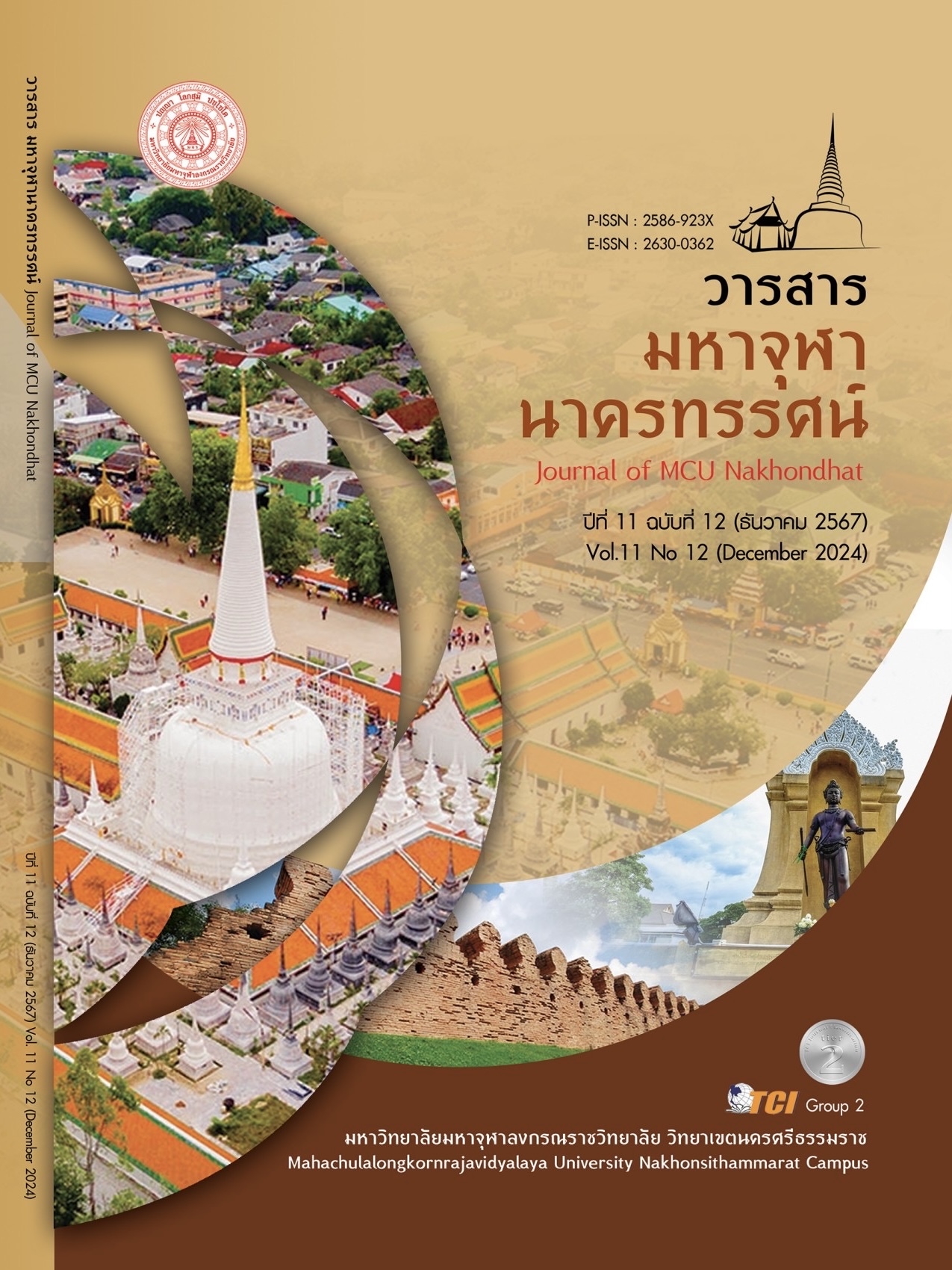PERCEIVED AND MANAGEMENT FOR PANDEMIC CONTROL OF VIRUS CORONA 2019 OF THE HEAD OF CHILD DEVELOPMENT CENTER
Main Article Content
Abstract
This research aimed to study: 1) The level of perception of COVID-19 using the health belief model framework; 2) The level of disease control management according to the Ministry of Public Health's guidelines; and 3) The relationship between the level of perception in each aspect and the overall management level. The research was descriptive research. The sample group was 108 heads of child development centers in Pathum Thani Province. Data were collected between October 2022 and February 2023. The research instruments were 1) Personal information questionnaire; 2) COVID-19 perception questionnaire; 3) Management questionnaire. The content validity of the questionnaire was = 0.67 - 1.00, 0.70 - 0.85, 0.75 - 0.82. The questionnaire was then piloted with 30 people with similar characteristics to the sample group, namely, 30 heads of child development centers in Nonthaburi Province. The reliability was calculated using the Conbrach Alpha Coefficiency statistic, which was = 0.76, 0.85. The data were analyzed statistically by frequency distribution, mean, and standard deviation. The relationship between the level of perception in each aspect and The overall management level by Pearson's correlation coefficient. The research results found that the heads of child development centers had a high level of disease severity and risk perception. The low level of disease prevention benefits and obstacles. The overall disease control management was at a moderate level. There was a statistically significant positive relationship at the .01 level between each aspect of perception and overall management as follows: 1) Perception of disease severity (r = .592), 2) Perception of disease risk (r = .507), 3) Perception of disease prevention benefits (r = .228), and 4) Perception of disease prevention obstacles (r = .205). The heads of child development centers should be supported to have a higher awareness of disease benefits and obstacles.
Article Details

This work is licensed under a Creative Commons Attribution-NonCommercial-NoDerivatives 4.0 International License.
References
กรมสุขภาพจิต. (2564). นักวิจัยอิสราเอลพบ ภาวะขาดวิตามินดี เอี่ยวป่วยโควิด - 19 รุนแรง. เรียกใช้เมื่อ 27 ธันวาคม 2566 จาก https://dmh.go.th/newsdmh/view.asp?id=30893
เชาวลิต เลื่อนลอย. (2565). ปัจจัยที่มีผลต่อพฤติกรรมการป้องกันโรคติดเชื้อโควิด 19 ของประชาชน อำเภอศรีนคร จังหวัดสุโขทัย. วารสารสาธารณสุข และสุขภาพศึกษา, 2(1),18-33.
ปิยะนันท์ เรือนคำ และคณะ. (2565). ปัจจัยที่มีความสัมพันธ์กับพฤติกรรมการป้องกันโรคติดเชื้อไวรัสโคโรนา 2019 ของประชากรผู้ใหญ่: กรณีศึกษาเขตจอมทอง กรุงเทพมหานคร. วารสารวิชาการสาธารณสุข, 31(2), 247-259.
พิมสิริ ภู่ศิริ และคณะ. (2565). การติดเชื้อโควิด 19 ในเด็ก. วารสารการพยาบาลและสุขภาพ สสอท, 4(1),1-13.
มินลา นาคหนุน และคณะ. (2566). ปัจจัยที่มีอิทธิพลต่อพฤติกรรมการดำเนินงานควบคุมโรคติดเชื้อไวรัสโคโรนา 2019 ในชุมชนของอาสาสมัครสาธารณสุขประจำหมู่บ้าน. วารสารไทยเภสัชศาสตร์และวิทยาการสุขภาพ, 18(4), 101-108.
วิญญ์ทัญญู บุญทัน และคณะ. (2563). ปัจจัยที่มีอิทธิพลต่อพฤติกรรมการสร้างเสริมสุขภาพในการป้องกันการติดเชื้อโควิด19 ของผู้สูงอายุ. วารสารพยาบาลตำรวจ, 12(2), 323-337.
วิภา บัวสนิท และ ศากุน บุญอิต. (2563). การรับรู้ความเสี่ยง การสื่อสารและพฤติกรรมการป้องกันตนเองระหว่างเกิดโรคโควิด 19. เรียกใช้เมื่อ 15 ตุลาคม 2567 จาก https://digital.library.tu.ac.th/tu_dc/frontend/Info/item/dc:184288
ศูนย์จีโนมฯ รพ.รามาธิบดี. (2566). ให้คำตอบ “เราควรยุติการฉีดวัคซีนเข็มกระตุ้น เพื่อป้องกันโควิด - 19 กัน แล้วหรือไม่”. เรียกใช้เมื่อ 17 พฤศจิกายน 2566 จาก https://www.thairath.co.th/news/society/2704430
ศูนย์พัฒนาเด็กเล็ก. (2562). โครงการความร่วมมือทางวิชาการระหว่างกรมส่งเสริมการปกครองท้องถิ่นกับมหาวิทยาลัยสวนดุสิต. เรียกใช้เมื่อ 29 กันยายน 2564 จาก http://www.dusitcenter.org/schools/?code=19827®ion=central&prov=ปทุมธานี
สุภาภรณ์ วงธิ. (2564). ปัจจัยที่ส่งผลต่อพฤติกรรมการป้องกันโรคติดเชื้อโควิด 19 ของอาสาสมัคร สาธารณสุขประจำหมู่บ้าน จังหวัดสุโขทัย. ใน วิทยานิพนธ์สาธารณสุขศาสตรมหาบัณฑิต สาขาวิชาสาธารณสุข. มหาวิทยาลัยนเรศวร.
อภิวดี อินทเจริญ และคณะ. (2564). ปัจจัยที่มีผลต่อพฤติกรรมการป้องกันโรคติดเชื้อไวรัสโคโรนา 2019 ของประชาชนเขตเทศบาลเมืองคอหงส์ จังหวัดสงขลา. วารสารสภาการสาธารณสุขชุมชน, 3(2), 19-30.
อารี ชีวเกษมสุข. (2560). สมรรถนะผู้นำทางการพยาบาล แนวคิดและการพัฒนา. นนทบุรี: มหาวิทยาลัยระบบเปิดสุโขทัยธรรมาธิราช.
เอกชัย เพียรศรีวัชรา. (2565). กรมอนามัยเผย “เด็กปฐมวัยป่วยโควิดแล้วกว่า 1 แสนราย สาเหตุจากติดเชื้อในครอบครัว”. เรียกใช้เมื่อ 17 ธันวาคม 2566 จาก https://www.thairath.co.th/news/local/2323395
Becker, M. H. (1974). The Health Belief Model and Sick Role Behavior. Health Education Monographs, 2(4), 409-419.
National Statistical Office Thailand. (2022). Thailand Multiple Indicator Cluster Survey 2019, Survey Findings Report. Retrieved December 2023, 17, from https://www.unicef.org/thailand/media/5146/file/Multiple%20Indicator%20Cluster%20Survey%202019.pdf#page=178
World Health Organization. (2021). COVID-19 in children and adolescents: Scientific brief. Retrieved December 2023, 17, from https://www.who.int/publications/i/item/WHO-2019-nCoV-Sci_Brief-Children_and_adolescents-2021.1


